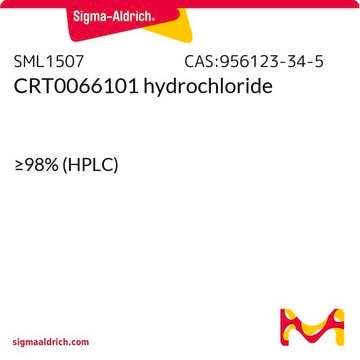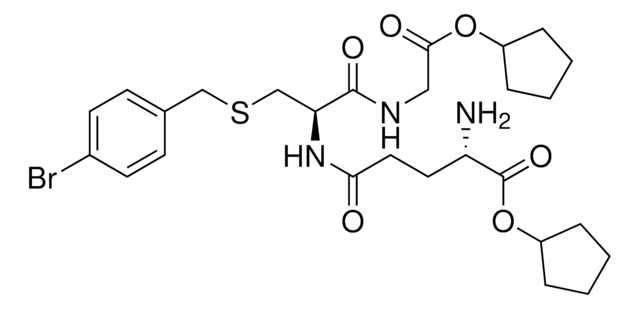SML3523
Solriamfetol hydrochloride
≥98% (HPLC)
Synonym(s):
(2R)-2-Amino-3-phenylpropyl carbamate hydrochloride, (R)-2-amino-3-phenylpropylcarbamate hydrochloride, ADX-N 05, ADX-N05, JZP 110, JZP-110
Sign Into View Organizational & Contract Pricing
All Photos(1)
About This Item
Empirical Formula (Hill Notation):
C10H14N2O2 ·HCl
CAS Number:
Molecular Weight:
230.69
MDL number:
UNSPSC Code:
12352200
NACRES:
NA.04
Recommended Products
Quality Level
Assay
≥98% (HPLC)
form
powder
drug control
USDEA Schedule IV
storage condition
desiccated
color
white to beige
solubility
DMSO: 2 mg/mL, clear
storage temp.
2-8°C
Biochem/physiol Actions
Solriamfetol (JZP-110) is a potent and selective dual reuptake inhibitor at dopamine and norepinephrine transporters that increases extracellular levels of dopamine and norepinephrine in vivo. Solriamfetol is a wake-promoting agent.
Caution
Hygroscopic
Storage Class Code
11 - Combustible Solids
WGK
WGK 3
Flash Point(F)
Not applicable
Flash Point(C)
Not applicable
Certificates of Analysis (COA)
Search for Certificates of Analysis (COA) by entering the products Lot/Batch Number. Lot and Batch Numbers can be found on a product’s label following the words ‘Lot’ or ‘Batch’.
Already Own This Product?
Find documentation for the products that you have recently purchased in the Document Library.
Richard K Bogan et al.
Sleep medicine, 16(9), 1102-1108 (2015-08-25)
JZP-110 is a wake-promoting agent with dopaminergic and noradrenergic activity. This double-blind, crossover study, randomized adults with narcolepsy with or without cataplexy (N = 33) to placebo or JZP-110 at 150 mg/day (weeks 1 and 3) increased to 300 mg/day (weeks 2 and 4).
Michelle G Baladi et al.
The Journal of pharmacology and experimental therapeutics, 366(2), 367-376 (2018-06-13)
Excessive sleepiness (ES) is associated with several sleep disorders, including narcolepsy and obstructive sleep apnea (OSA). A role for monoaminergic systems in treating these conditions is highlighted by the clinical use of US Food and Drug Administration-approved drugs that act
Stefano de Biase et al.
Expert opinion on investigational drugs, 26(8), 953-963 (2017-07-21)
Narcolepsy is a chronic sleep disorder characterized by a pentad of excessive daytime sleepiness (EDS), cataplexy, sleep paralysis, hypnagogic/hypnopompic hallucinations, and disturbed nocturnal sleep. While non-pharmacological treatments are sometimes helpful, more than 90% of narcoleptic patients require a pharmacological treatment.
Our team of scientists has experience in all areas of research including Life Science, Material Science, Chemical Synthesis, Chromatography, Analytical and many others.
Contact Technical Service






